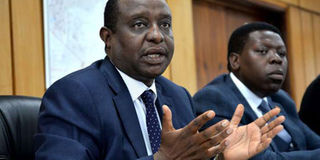Parliament to assess budget as KRA fails to meet target

National Treasury Cabinet Secretary Henry Rotich (left) with Water and Irrigation boss Eugene Wamalwa during the signing of a credit agreement with the Government of Belgium for the Vihiga County Cluster Water Supply Project, at Treasury building in Nairobi on April 14, 2016. Treasury wants to increase its tax collection to Sh1.37 trillion, from the Sh1.18 trillion it had set as the target in the current financial year. PHOTO | SALATON NJAU | NATION MEDIA GROUP
What you need to know:
- Overall, the largest allocations are to the Transport ministry at Sh358 billion, Education (Sh144.9 billion), Interior with Sh120 billion and Defence (Sh100 billion).
- In the budget, Sh850 billion is meant to go into recurrent expenditure, operations and maintenance in the ministries and departments as well as the salaries and wages of civil servants and elected representatives.
The Kenya Revenue Authority has again failed to meet its revenue collection target with Parliament readying to examine a proposed budget of Sh2.26 trillion for the government’s financial year.
Treasury wants to increase its tax collection to Sh1.37 trillion, from the Sh1.18 trillion it had set as the target in the current financial year.
“A reputable consulting firm has been engaged to deep-dive into the authority’s business processes and systems to propose realistic adjustments intended to reverse the shortfalls,” Treasury CS Henry Rotich said.
Despite simplifying and modernising the laws on Value Added Tax, Excise Duty and revamping taxation procedures, the authority has still failed to meet its targets.
Mr Rotich was forced to cut development expenditure by Sh49 billion because of lower revenue collection than expected and the slow intake of funds.
Development expenditure was set at Sh526.6 billion.
“It has been the trend in Kenya to have optimistic economic growth projections, which often result to higher projection of revenues,” the Liason Committee said after scrutinising the Supplementary Budget.
According to a summary of the estimates, the budget has a deficit of Sh689 billion.
This money is expected to come from project loans (Sh345.4 billion), commercial financing (Sh153.7 billion), domestic borrowing (Sh241 billion) and donors who fund specific programmes (Sh3.8 billion).
The estimates, which were submitted to the National Assembly late Thursday evening, will now be scrutinised by the departmental committees as well as the newly-formed Budget and Appropriations Committee.
ALLOCATIONS
Overall, the largest allocations are to the Transport ministry at Sh358 billion, Education (Sh144.9 billion), Interior with Sh120 billion and Defence (Sh100 billion).
The budget is Sh200 billion more than the government planned to spend at the beginning of the current financial year, which began on July 1, 2015.
In the budget, Sh850 billion is meant to go into recurrent expenditure, operations and maintenance in the ministries and departments as well as the salaries and wages of civil servants and elected representatives.
Salaries paid to civil servants are expected to take Sh360.7 billion, Sh37 billion more than the Sh333.5 billion that will be spent by the time the current financial year ends on June 30.
Treasury plans to spend Sh809 billion on development, of which Sh398.4 billion will be from domestic resources and Sh410.6 billion from foreign finances.
In development, the biggest allocations are to: Department of Transport (Sh175 billion), Infrastructure (Sh175 billion), Energy ministry (Sh120.1 billion), Water ministry (Sh57.7 billion), Department of Planning (Sh53.8 billion) and Treasury (Sh45.2 billion).
Under the Infrastructure docket, Sh154 billion is part of the loan by China for the standard gauge railway.
Parliament has been allocated Sh24.6 billion against its plan to spend Sh31.9 billion, Judiciary Sh15.3 billion and the Independent Electoral and Boundaries Commission Sh19.6 billion as it starts preparing for the 2017 election.





